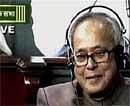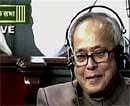

"To insulate (common man) from the adverse impact of price rise we are improving the PDS system...this year the prices have not come down after the festival season," Finance Minister Pranab Mukherjee said while replying to a discussion on the first batch of supplementary demands for grants in the Lok Sabha here.
According to recent data, food inflation during November shot up to over 19 per cent, the highest in the decade.
Attributing rising prices to shortage of supply, Mukherjee said, "the price rise is not because of demand management... edible oils, sugar and pulses are the things most affected by the price rise."
The Minister also recalled various steps taken by the government to improve supplies of essential foods items like pulses and sugar, the prices of which have shot up significantly during the course of the year.
The supplementary demands for grants, which was approved by the Lok Sabha, seeks to raise public expenditure by Rs 25,725 crore, over and above what was approved by Parliament during the budget.
"In edible oils, India has always had a shortfall. We always import ... So, if the international prices go up then the domestic rates also suffer," the Finance Minister said.
In pulses, there is a problem that no farmer is ready to grow them, he said, adding, "We are looking at another package which can induce the farmers to grow more pulses."
Pranab Mukherjee conceded that price is an important issue that needs to be tackled and said the government is monitoring 14 essential items on a daily basis.
He assured proper supply of wheat and rice, of which there is no shortage, through efficient PDS, and said rising minimum support price (MSP) is pushing up prices.
Mukherjee said there is ample liquidity in the system, however, he expressed concern over exports that has been on year-on-year decline since October 2008.
He said the country should diversify in terms of export destinations to insulate itself from problems in India's traditional markets like the US, Europe and Japan.